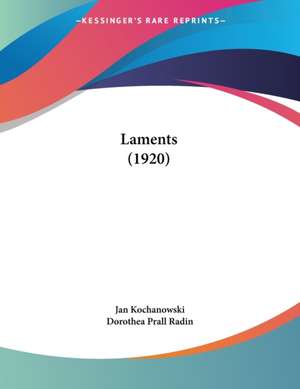Laments (1920)
Autor Jan Kochanowskien Limba Engleză Paperback – 15 oct 2009
Preț: 148.95 lei
Nou
Puncte Express: 223
Preț estimativ în valută:
28.50€ • 29.72$ • 23.69£
28.50€ • 29.72$ • 23.69£
Carte tipărită la comandă
Livrare economică 17-22 martie
Preluare comenzi: 021 569.72.76
Specificații
ISBN-13: 9781120310408
ISBN-10: 1120310407
Pagini: 36
Dimensiuni: 216 x 280 x 3 mm
Greutate: 0.16 kg
Editura: Kessinger Publishing
ISBN-10: 1120310407
Pagini: 36
Dimensiuni: 216 x 280 x 3 mm
Greutate: 0.16 kg
Editura: Kessinger Publishing
Notă biografică
Jan Kochanowski (1530-1584) was one of the most eminent Polish Renaissance poets of the 16th century and is widely regarded as the most accomplished and the most significant representative of Polish literature until the 19th century. He is often referred to as the father of Polish literary language and is best known for his mastery of the Polish poetic language and forms.Born in 1530 into a noble family in Sycyna, Kochanowski studied at the Jagiellonian University in Kraków and later, between 1552 and 1559, at the University of Padua in Italy. His time in Italy exposed him to the great works of the Italian Renaissance, and he became fluent in Latin, Greek, and Italian, which significantly influenced his own work.Upon his return to Poland, Kochanowski served as a secretary at the royal court in Kraków. He was also a member of the Polish parliament, a courtier, and a landowner. Despite his duties, he dedicated his life to writing. His works covered a variety of genres and themes, including epigrams, epic poetry, lyrical poetry, and dramatic tragedy.Kochanowski's most renowned work is "Treny" (Threnodies, 1580), a series of elegies upon the death of his beloved daughter Urszula. It is considered a masterpiece of Renaissance literature, notable for its emotional depth and exploration of personal grief.Kochanowski's influence on Polish literature is immense. He elevated the Polish language to a high artistic level and set a precedent for the Polish literary culture. He died in 1584, leaving behind a legacy that continues to resonate in Polish literature and culture.
